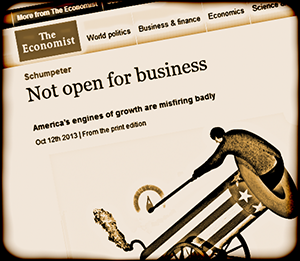How often do you encounter a phrase like this (from the current issue of the Economist)?
Immigrants are responsible for launching about half the country’s most successful start-ups and producing a striking number of its patents.

Representative Zoe Lofgren (D - Silicon Valley), the ranking member of the House Immigration Subcommittee, used numbers while saying approximately the same thing:
More than 52 percent of Silicon Valley startups were founded or co-founded by immigrants, and immigrant-founded companies produced $52 billion in sales and employed 450,000 workers in 2005.
To help me sort through these frequent claims, I called upon two H-1B gurus, Norm Matloff, the West Coast academic, and John Miano, the East Coast attorney and fellow CIS blogger.
Start-ups. Miano’s response was that the founders-claim thesis related to the fact that, yes, some successful start-ups did have some immigrants among their founders, but, more importantly, a hidden statistical sleight-of-hand was at work. I quote:
Let's take four U.S. companies and their founders
Microsoft (Paul Allen, Bill Gates)
HP (William Hewlett, David Packard)
Google (Larry Page, Sergey Brin, an immigrant)
Intel (Robert Noyce, Gordon Moore)The percentage of immigrant founders in this sample (13%) is roughly the same as in the population.
The percentage of immigrant-founded companies is 25%. Wow we need immigrants!
What they do is count any company with a single immigrant founder as being immigrant-founded.
Notice this works both ways.
The number of native-founded companies in this sample is 100%. Wow, we don't need immigrants.
Miano goes on to point out that as the total number of founders per start-up rises, so does the statistical likelihood of one of them being an immigrant. Further, sometimes those working with these numbers go beyond the actual signers of the corporate papers to early employees, making the pool that much larger, and the claims of immigrant contribution seemingly more dramatic.
What we always hear is the percentage of immigrant-founded or co-founded firms but never the percentage of immigrants among the founders, two quite different concepts.
The irony is, of course, that most of those using the “start-up founders are immigrants” argument – the Microsofts and the Chambers of Commerce – want neither more entrepreneurs nor more start-ups. What they really are seeking is more nonimmigrant (H-1B and L-1) high-tech workers to lower the wages within the engineering operations of their own companies.
They want more cake (i.e., docile, skilled, ill-paid workers who are NOT citizens), but they always talk about the frosting (the start-ups).
Patents. They are much more numerous than successful start-ups; in fact, the Patent Office approves an average of about a quarter of a million of them a year. Securing a patent sometimes is a reflection of a truly remarkable invention, and other times it is little more than a legal confirmation of the registration of a relatively minor tweak to an existing process, drug, or machine.
Further, patents are a measure of success in only a rather small segment of our life as a nation; physicians save lives, authors get copyrights for books, politicians win elections, legislators pass bills, judges make decisions, hedge fund managers make (or lose) billions, actors, producers and directors create movies, but none of the work in any of these fields – positive though it may be – is reflected in the award of a patent.
The Economist, incidentally, in its quotation earlier uses the concept of a “striking number,” an absolute number, apparently, regarding the migrants’ production of patents. Given the huge total number of the patents, and the fact that the foreign-born constitute about 13% of the U.S. population, if the FB were filing only their share of patents, they would have some 30-35,000 of them a year, which can easily be described as a “striking” number.
The more pertinent question is: did they file a disproportionate percentage of the patents?
Within those contexts, let’s look at what Matloff, an IT professor UC-Davis, has to say in a report on the broader subject of “Are Foreign Students the Best and Brightest?” written for the Economic Policy Institute earlier this year.
Matloff examined several studies by other scholars, as well as his own regression analysis of National Survey of College Graduates data from the National Science Foundation on the determinants of patent application rates.
His conclusion: “In summary, the former [foreign] computer science students apply for somewhat fewer patents than do their American peers, and also are awarded fewer patents that are eventually commercialized. In the case of electrical engineering, the foreign and American groups have the same mean numbers of patent applications, both general and commercialized. Again, the data do not show a best and brightest tendency among the former foreign students.”
A commercialized patent, apparently, is one that can make money for its owners.
So, where is Mark Twain when we really need him?
I am grateful to William Chip, a CIS board member, for suggesting this topic, and to Messrs. Matloff and Miano for their assistance with this blog.
